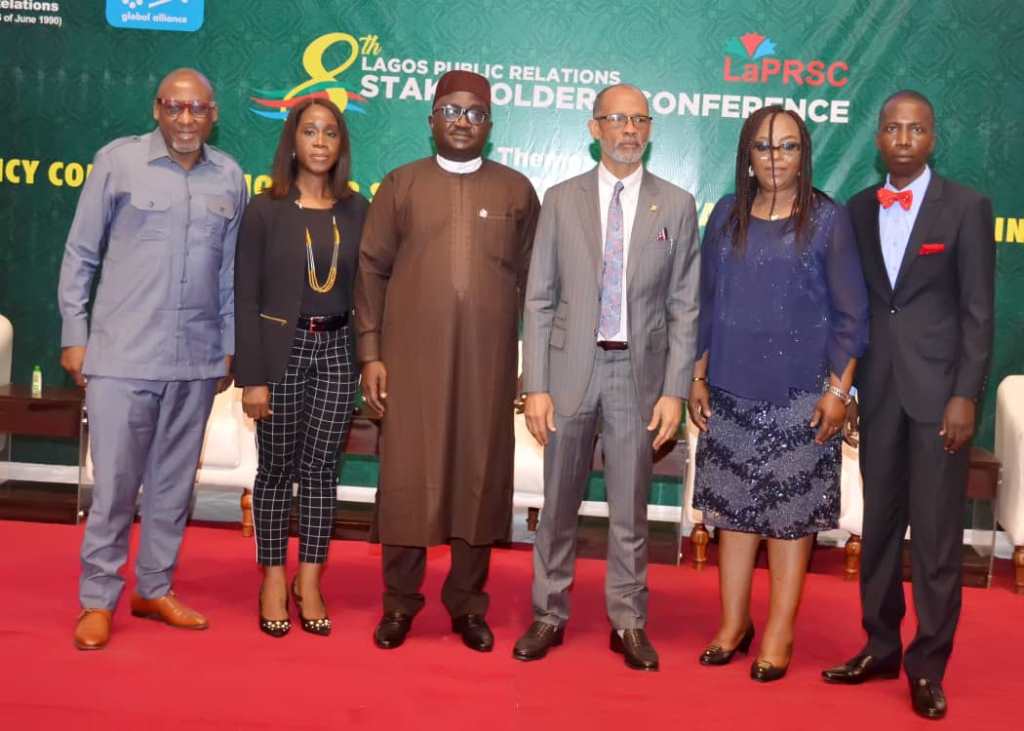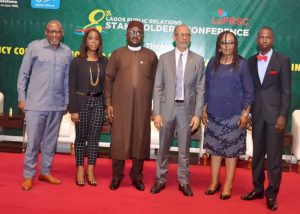Health
Sanwo-Olu Enlists Support of PR Practitioners and Stakeholders to Check Covid-19 Spread


L-R President African Public Relations Association, Mr Yomi Badejo – Okusanya; Executive Secretary MTN Nigeria Foundation, Mrs Odunayo Sanya; President and Chairman of Council, Nigerian Institute of Public Relations, Mallam Mukhtar Sirajo; Lagos State Commissioner for Health, Prof Akin Abayomi; Chairman, Nigerian Institute of Public Relations, Lagos Chapter, Mr Comfort Nwankwo and the Conference Convener, CEO Addefort Limited, Mr Olabamiji Adeleye at the 8th Lagos Public Relations Stakeholders’ Conference, Promoting Healthcare and Wellness at the MUSON Centre, on Thursday August 26, 2021.
Sanwo-Olu Enlists Support of PR Practitioners and Stakeholders to Check Covid-19 Spread
….promises to transform medical infrastructure in Lagos
AJAGBE ADEYEMI TESLIM
SPONSORED BY: H&H
Lagos State Governor, Babajide Sanwo-Olu has Sanwo-Olu called on Public Relations Practitioners and other Public Communication expert to key into the administration’s strategies to mitigate the effect of COVID-19 Delta Variant and other health challenges on Lagosians.
He promised to transform medical infrastructure in Lagos to discourage outbound medical travels and attract medical tourism to the state.
Sanwo-Olu who disclosed this on Thursday at the 8th Lagos Public Relations Stakeholders’ Conference with the theme: Policy Communication for Sustainable Healthcare and Wellness in Nigeria, urged individuals, corporate bodies and leaders in different spheres of life to join hands with the government in building a healthcare system that is reliable, affordable and sustainable for the people.
“Ladies and gentlemen, let me stress that in Lagos, we prioritize the health of residents. Hence, we are working hard to improve public health facilities across the state.
“The construction of new Massey Street Children Hospital as well as a new General Hospital at Ojo LGA has commenced.
The objective is to improve medical infrastructure, boost access to quality healthcare service and achieve universal health service.
” It is also meant to improve the state’s health indices, discourage outbound medical travels and attract medical tourism to Lagos as well as improve work experience of health workers.
“Similarly, we have begun phased deep refurbishment and renovation of General Hospitals in the state.
“Thus, comprehensive renovation work is ongoing at the Ebute Metta Heath Centre, Harvey Road Health Centre, General Hospital, Odan-Lagos, General Hospital, Isolo and Ketu-Ejirin Health Centre,” he said.
Sanwo-Olu who was represented the Commissioner for Health, Dr. Akin Abayomi said the objectives are to improve health infrastructure, increase capacity for human resource for health and improve work experience of health workers.
“Permanent Triage and Oxygen Therapy Centres have also been established to effectively manage serve to critical cases in high burden Local Government Areas to support patients with oxygen before they are transferred to isolation care centers.
“The care centers, which are permanent facilities will be an addition to the existing infrastructure in the hospitals and the facility after the pandemic and thy can be used for other healthcare purposes.
“In addition, the Lagos State Health Insurance Scheme (LHIS) was introduced to make healthcare delivery affordable to families and individuals across the state with the “Ilera Eko” Scheme.
This scheme has assisted in providing quality, yet affordable health care to Lagosians in areas such as outpatient common ailments and conditions such as malaria, management of uncomplicated chronic diseases such as hypertension, diabetes and asthma.
“Through the Public Private Partnership, we have also placed a forward moving agreement on health as well as encourage innovation on maintenance and sustainability of the state’s health sector.
“As a testimony to our government’s resolve to improve the residents’ health, a wellness centre was established at the Secretariat, Alausa to assist public servants with depression and other mental health challenges.
“Ladies and Gentlemen, as I draw a close, I solicit the cooperation of members of NIPR in Lagos State to join us in championing mental reorientation among the citizenry.
” I also seek your enduring partnership and understanding with the government in all mutually rewarding areas. Our unique strength as a state is our developmental plan, optimism and work ethics, our diversity as well as commitment to the upliftment of the well-being of the people,” he said.
The governor calls more public sensitization to mitigate the effect of COVID-19 Delta Variant and other health challenges on Lagosians.
“On Monday, I gave an update on the challenges posed by COVID-19 Delta Variant Pandemic and our proactive responses to enhance ongoing preventive protocols to be observed by all members of the public. I have to reiterate that our COVID-19 Care Centers are functional with healthcare personnel to attend to incidents effectively.
“We have commenced dispensation of the second phase of the vaccine programme which has been positively accepted by members of the public.
“However, the consumption rate for oxygen for affected persons in the Care Centres has increased to over 400 cylinders daily. This is an indication on the need to step up the campaign and make our people understand that the battle against COVID-19 is not yet won, therefore, we cannot afford to let down our guards.
“At this time, we have to stand together and ensure that we play our roles as stakeholders and members of the community. We have to enlighten people in our various communities and neighborhood on the need to enhance personal safety hygiene standards.
“In a social media driven era when the public information space is filled with all kinds of disinformation, misinformation and outright lies.
It is quite commendable that the Nigerian Institute of Public Relations, Lagos Chapter has always been at the forefront of promoting professionalism and objectivity in public information dissemination,” he said.
The annual Conference is the brainchild of Addefort Limited; a public relations and concept development firm. It is held in collaboration with the Nigerian Institute of Public Relations, Lagos.
